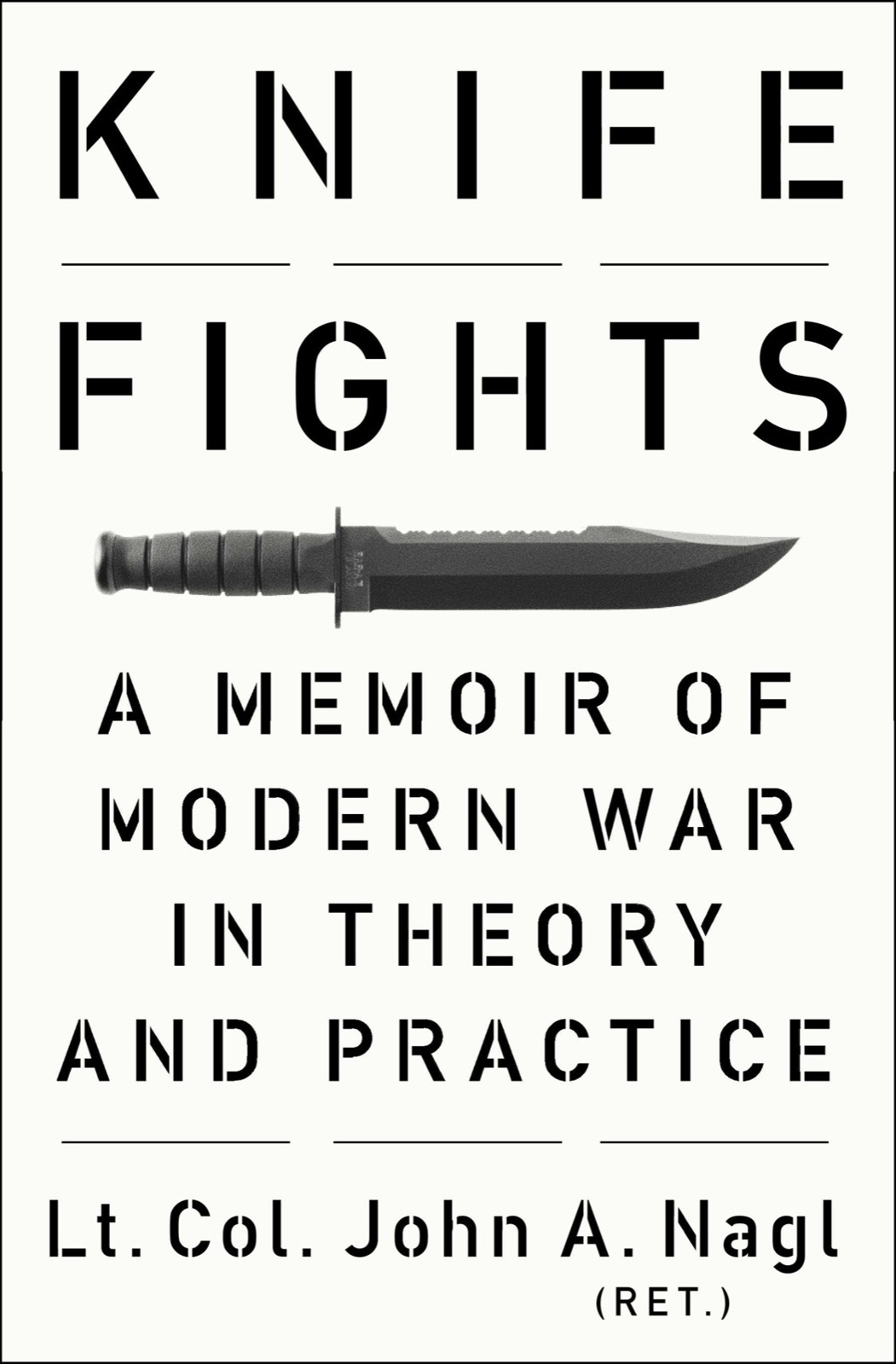
Knife Fights
A Memoir of Modern War in Theory and Practice
کتاب های مرتبط
- اطلاعات
- نقد و بررسی
- دیدگاه کاربران
نقد و بررسی

August 18, 2014
Nagl (Learning to Eat Soup with a Knife), a West Point graduate and Rhodes Scholar, was one of the U.S. military’s sharpest thinkers during his 20-year (1988–2008) Army career. Nagl commanded a tank platoon in the first Gulf War; earned a Ph.D. at Oxford; lead a tank battalion in the second war in Iraq; and served at the Pentagon as a counterinsurgency specialist (He also taught at West Point and Annapolis). This work is both a memoir and a treatise on American war strategy in the post-9/11 world; Nagl writes evocatively about his wartime experiences, clearly explaining his theories of waging asymmetric warfare. A critic of the Iraq war (“a war that did not need to be fought”), Nagl offers perceptive critiques of the serious mistakes made by Secretary of Defense Donald Rumsfeld and the military’s general officer corps. The latter, he says, “failed to prepare the army for the war it was actually going to have to fight,” and also failed “to rapidly adapt when the conventional army they had built was required to conduct counterinsurgency.” Nagl makes a strong case that the next war the U.S. engages in will require stronger counterinsurgency planning than Pentagon policy makers currently anticipate.

September 15, 2014
Nagl, a career officer and leading advocate for the Army's new counterinsurgency doctrine, delivers a lively memoir that combines battlefield experiences with military politics. A West Point graduate and Rhodes Scholar, the author studied international relations before commanding a tank platoon during the 1991 Gulf War. "The rest of the world had seen the ease with which America's conventional military forces cut through the Iraqi military," he writes. "They would have been crazy to fight us that way again." Sadly, American military leaders hated their experience fighting the Viet Cong and continued to train forces to fight conventional, World War II-type campaigns. Nagl returned to Oxford, earning a doctorate with a thesis comparing how Britain and America handled insurgencies in Malaya and Vietnam. Deployed to Iraq in 2003, he describes his brutal education in the realities of counterinsurgency. His military writing and thesis-published in 2002 as Learning to Eat Soup with a Knife-earned him appointment as military assistant in the Department of Defense, where he joined a team led by Gen. David Petraeus, who wrote the landmark 2007 counterinsurgency field manual. Its enthusiastic reception did nothing for Nagl's career, however, and he retired in 2008 to join the Center for a New America, an influential Washington think tank where he continues to speak out on security issues. Insurgents win when opponents grow tired of the struggle, he notes, and Americans are clearly in that category. "If Iraq was the midterm," writes the author, "Afghanistan is the final exam. It's a lot harder than the midterm." Nagl warns that our lack of patience means that Iraq's and Afghanistan's futures remain uncertain-and readers will note that he wrote this book before the current meltdown in Iraq. A thoughtful, lucid, not-terribly-optimistic autobiography of a scholarly soldier.
COPYRIGHT(2014) Kirkus Reviews, ALL RIGHTS RESERVED.

September 15, 2014
Nagl's Learning to Eat Soup with a Knife (2002) is now considered an indispensable text on the techniques of counterinsurgency. But when he wrote the book, he was widely criticized for saying that many of the American military's key procedures and tactics would not serve them well in future wars. Here, he shows how the post-9/11 wars in Afghanistan and elsewhere demonstrated that, as he had predicted, American forces were unprepared for the sort of wars they were now fighting, wars involving small pockets of enemy insurgents and localized dissidents. After many years in combatthis book is, in part, a combat memoirthe author was reassigned to the Pentagon, where he was tasked with rewriting the long-standing military principles of making war in the modern era. It was an exhilarating assignment, turning his once-criticized theories into reality, but Nagl soon discovered that the battles he would need to fight inside the walls of the Pentagon could be as dirty as those he fought in combat. An essential addition to military-history collections.(Reprinted with permission of Booklist, copyright 2014, American Library Association.)

October 1, 2014
In this memoir, retired lieutenant colonel Nagl (headmaster, Haverford Sch.; Learning To Eat Soup with a Knife) recounts his experiences serving in the military at a time when threats facing the United States were rapidly changing. After graduating from West Point and Oxford, Nagl led a tank company in Iraq during Operation Desert Shield. Upon returning home, he became convinced that, unlike more traditional battles encountered in the Gulf War, future combat would be unpredictable and unconventional. With this in mind, Nagl went on to study counterinsurgency, a move that eventually brought him to the Pentagon where he coauthored a revolutionary counterinsurgency military field manual that would have a profound impact on our approach to the wars in Iraq and Afghanistan. VERDICT While not as broadly appealing as Robert Gates's Duty, nor as gritty as its title seems to suggest (much of the book is more analysis than narrative), this account is nonetheless an honest and informative glimpse into both the past and the future of the ongoing war on terror. Military buffs, policy wonks, and anyone wishing to learn more about America's role in the world should find Nagl's work an alluring and important read.--Laura Marcus, Odenton, MD
Copyright 2014 Library Journal, LLC Used with permission.

May 1, 2014
A retired lieutenant colonel, Nagl realized in the first Gulf War that conventional warfare was being replaced by asymmetric warfare--battling guerrillas, terrorists, and insurgents. He returned to Oxford to study counterinsurgency (he had already studied there and at West Point), and eventually coauthored the U.S. Army and Marine Corps counterinsurgency field manual with generals David Petraeus and James M. Mattis.
Copyright 2014 Library Journal, LLC Used with permission.

























دیدگاه کاربران